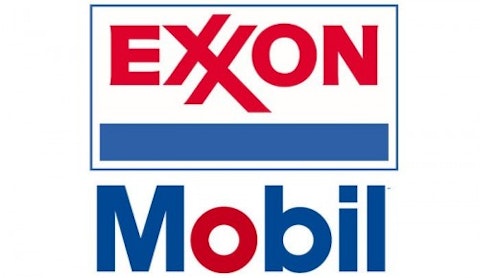Exxon Mobil Corporation (NYSE:XOM) has a triple A credit rating and enough cash flow to cover its dividend distribution. The fall in energy prices provides Exxon with an opportunity to acquire weaker companies at attractive prices. Given its leading position in the energy sector and a forward PE of just 17, shares of Exxon are cheap.

It used to be that large integrated companies like Exxon Mobil Corporation (NYSE:XOM) were considered relics of the past. Exxon didn’t grow as quickly as the new generation of shale companies did and wasn’t as nimble as the large oil service companies. After crude crashed however, the integrated model of Exxon suddenly looks a lot better. After the crash, the fast-growing shale companies slashed their capital expenditure budgets significantly in a bid to survive and the nimbler oil service companies resorted to merging and layoffs in order to maintain their return on capital. Exxon, on the other hand, is doing just fine. When crude prices fell, Exxon’s downstream earnings increased over 100% to partially compensate for the fall in Exxon’s upstream profits. Because of Exxon’s integrated approach, the company handily beat analyst estimates for its first quarter, reporting an EPS of $1.17 versus expectations of $0.83. The company also made $8.5 billion in first quarter operating cash flow, enough to cover its dividend distribution.
A big reason for Exxon’s great financial performance is that the company invests in only the best risk/reward projects. The discipline allows Exxon to maintain its business-as-usual approach while others downsize. While other energy companies have cut their 2015 capital expenditure budgets by 15%-20% or more, Exxon Mobil Corporation (NYSE:XOM) has cut its 2015 capital expenditure budget by just 12%. While Exxon’s super-major peers plan to divest significant non-core assets, Exxon Mobil Corporation plans to divest just $6 billion in non-core assets. The fall in crude prices may prove to be a good thing for Exxon. Low crude prices have historically provided strong companies like Exxon with an opportunity to buy weaker energy companies at attractive prices. Exxon Mobil Corporation raised $8 billion in debt in March for just this purpose, with an eye towards possibly acquiring a major shale company operating in the Bakken, Eagle Ford, or Permian Basin. Given Exxon’s size and its AAA credit rating, all top notch shale companies are possible targets. If an acquisition occurs, Exxon’s reserves will increase.
Exxon Mobil Corporation shares are attractive. Exxon’s forward PE of 17 is lower than the S&P 500’s forward PE of 18. Exxon’s dividend yield of 3.1% is significantly better than the 10 year’s yield of 2.15%. Exxon management is very shareholder friendly. Since 2005, Exxon has done hundreds of billions of dollars in share buybacks to reduce Exxon’s float from 6.33 billion shares to 4.19 billion today. Not surprisingly, many hedge funds own Exxon Mobil Corporation (NYSE:XOM). Yacktman Asset Management owns seven million shares while Adage Capital Management owns more than half a billion dollars’ worth of Exxon. Fisher Asset Management also owns over four million shares.
Following the picks of hedge funds can generate significant alpha. Our research shows that the 15 most popular small-cap stocks among hedge funds have outperformed the market by nearly a percentage point per month between 1999 and 2012. We have been forward testing the performance of these stock picks since the end of August 2012. These stocks managed to return more than 132% over the ensuing 2.5 years and outperformed the S&P 500 Index by nearly 80 percentage points (read the details here).
Because of its great balance sheet and secure cash flows, Exxon Mobil Corporation (NYSE:XOM) is an all-weather security. In bad times, Exxon’s stock doesn’t fall that much and pays its shareholders a nice dividend. When crude fell over 50%, for example, Exxon’s stock fell just 19% peak-to-trough. In good times, Exxon Mobil Corporation reaps record corporate profits and buys back a lot of stock, rewarding shareholders for their loyalty. If history is any guide, Exxon shareholders will continue to realize great returns from their holding for decades to come.
Disclosure: None





